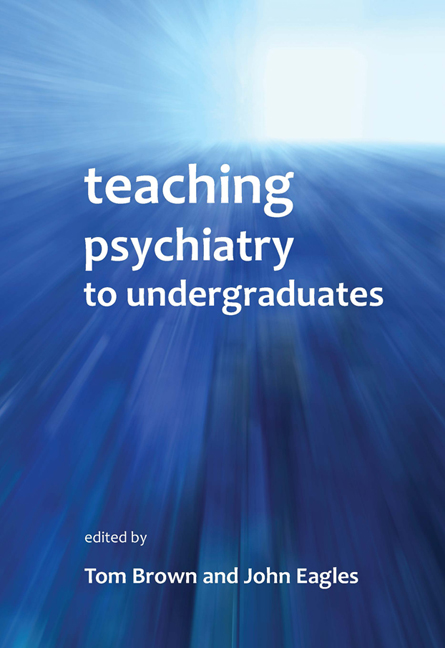Book contents
- Frontmatter
- Contents
- List of figures, tables and boxes
- List of contributors
- Preface
- Foreword
- 1 How do students learn?
- 2 Recent developments in undergraduate medical education
- 3 Undergraduate psychiatry teaching – the core curriculum
- 4 The organisation of undergraduate teaching
- 5 Assessment of undergraduates in psychiatry
- 6 Using computers to teach undergraduate psychiatry
- 7 How to give a lecture
- 8 How to do small-group teaching
- 9 Problem-based learning
- 10 Teaching trainee psychiatrists how to teach medical students: the Southampton model
- 11 Involving trainees in teaching
- 12 Involvement of service users in psychiatric education
- 13 Time-efficient clinical teaching
- 14 Intercalated degrees
- 15 Undergraduate experiences of psychiatry: a student view
- 16 Integration: teaching psychiatry with other specialties
- 17 Teaching the teachers in a cross-cultural setting: the Scotland–Malawi Mental Health Education Project
- 18 International undergraduate teaching
- 19 Teaching with simulated patients and role-play
- 20 Undergraduate medical education and recruitment to psychiatry
- 21 Choosing psychiatry: factors influencing career choice among foundation doctors in Scotland
- 22 Funding of the teaching of medical undergraduates
- 23 Dealing with students in difficulty
- 24 Training medical students to promote good mental health in secondary schools
- 25 Women in medicine
- Index
22 - Funding of the teaching of medical undergraduates
- Frontmatter
- Contents
- List of figures, tables and boxes
- List of contributors
- Preface
- Foreword
- 1 How do students learn?
- 2 Recent developments in undergraduate medical education
- 3 Undergraduate psychiatry teaching – the core curriculum
- 4 The organisation of undergraduate teaching
- 5 Assessment of undergraduates in psychiatry
- 6 Using computers to teach undergraduate psychiatry
- 7 How to give a lecture
- 8 How to do small-group teaching
- 9 Problem-based learning
- 10 Teaching trainee psychiatrists how to teach medical students: the Southampton model
- 11 Involving trainees in teaching
- 12 Involvement of service users in psychiatric education
- 13 Time-efficient clinical teaching
- 14 Intercalated degrees
- 15 Undergraduate experiences of psychiatry: a student view
- 16 Integration: teaching psychiatry with other specialties
- 17 Teaching the teachers in a cross-cultural setting: the Scotland–Malawi Mental Health Education Project
- 18 International undergraduate teaching
- 19 Teaching with simulated patients and role-play
- 20 Undergraduate medical education and recruitment to psychiatry
- 21 Choosing psychiatry: factors influencing career choice among foundation doctors in Scotland
- 22 Funding of the teaching of medical undergraduates
- 23 Dealing with students in difficulty
- 24 Training medical students to promote good mental health in secondary schools
- 25 Women in medicine
- Index
Summary
Introduction
In this chapter, we provide an overview of the funding mechanisms for medical student education in England and the other devolved countries of the UK, the implications for undergraduate psychiatric education and recommendations for the way forward.
Traditionally, National Health Service (NHS) trusts have provided clinical training for medical students, but with many universities now offering vertically integrated courses, the division between preclinical and clinical education is blurred and it is estimated that 70% of the teaching of medical students is undertaken by NHS staff (Catto, 2000).
Tomorrow's Doctors (General Medical Council, 2003) places renewed emphasis on student-centred learning, the acquisition of clinical skills and early patient contact, all of which increase the burden of teaching medical students on NHS staff, in both hospital and primary care settings. This presents new challenges, as teaching has often not been seen as a priority and teaching done by NHS staff has traditionally been unrecognised (for example in job plans) and unrewarded (Eagles, 2005). Accountability (both clinical and financial) has been identified as the key driver for improvement in quality (Scally & Donaldson, 1998). It follows that, in the interest of accountability, funding should follow students (Eagles, 2005). The current financial pressures within the NHS make this even more important, since the expectation that better services can be delivered from current resources (Department of Health, 2008) may increase the likelihood of funds being diverted from teaching to clinical services.
The cost of educating one medical student is estimated to be in the region of £200 000. Overall, in the 2005–06 cycle of funding, nearly £3.5 billion was spent on education in the NHS in England, of which a fifth (£728 million) was spent on medical student education. Efficient use of this money is of course vital, but equally important is its equitable distribution, especially as it represents a significant income stream for some trusts. Historically, the large teaching hospitals attached to universities secured the bulk of such funding at the expense of district general hospitals and primary care centres, but the latter are now increasingly offering clinical placements.
- Type
- Chapter
- Information
- Teaching Psychiatry to Undergraduates , pp. 264 - 277Publisher: Royal College of PsychiatristsPrint publication year: 2011



